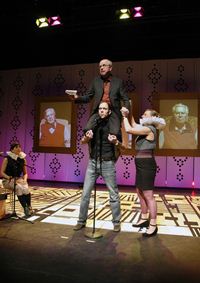Theatre that breaks boundaries and tosses expectation aside at Toronto’s World Stage
 When I walk into a theatre I tend to expect a fictional (or fictionalized) narrative with a structured arc, defined characters, etc. I tend to prefer things that are surreal, abstracted or absurd, but compared to the work of She She Pop, my usual tastes are tragically conventional. Happily, I had read enough about She She Pop & Their Fathers: Testament that I didn’t have any such expectations: I knew it would be performance art driven, so I walked in with an open mind and was happily delighted with the experience.
When I walk into a theatre I tend to expect a fictional (or fictionalized) narrative with a structured arc, defined characters, etc. I tend to prefer things that are surreal, abstracted or absurd, but compared to the work of She She Pop, my usual tastes are tragically conventional. Happily, I had read enough about She She Pop & Their Fathers: Testament that I didn’t have any such expectations: I knew it would be performance art driven, so I walked in with an open mind and was happily delighted with the experience.
In She She Pop & Their Fathers: Testament, the members of the German performance Collective She She Pop bring their own real fathers on stage to probe at the pains and complexities of their relationships, beginning from the baseline of King Lear.
In Shakespeare’s famous play, the king demands his daughters shower him with love in return for their inheritances, although he also has an ulterior motive: to ascertain which daughter would take the best care of him in his dotage. These issues are still pertinent today, complicated by legalities around wills and life-extending medical advances. She She Pop posits their fathers as kings, who may withhold inheritances due to childlessness, who may die slowly and painfully requiring their children to change their diapers, who cling jealously onto their patriarchal power long after it has become ridiculous.
And then they reverse it: as the elderly become children again, they become King Lear’s daughters, competing for affection. And then the roles keep reversing, twisting and changing as the performers reveal their own personal experiences in painful detail.
But it’s funny! And that’s what makes the piece; it is effectively poignant because it is also hilarious, often at the same time. For example, at one point, a father is singing – badly – Whitney Houston’s I Will Always Love You, under a daughter’s heartfelt speech. I didn’t just laugh and cry during this show: I laughed while I cried.
There was a section where I didn’t really understand what was going on, and my companion for the evening had the same experience at the same point. It could be that they momentarily dove into the sort of empty rhetoric that I tend to see, and dislike, in performance art, or it could be that something was lost in translation. I‘d like to give She She Pop the benefit of that doubt.
About translation: the show is in German with English surtitles. I like text and I read very quickly, so I love surtitles. In this show I sometimes felt like not everything said was being translated and I found this slightly frustrating, although it’s also quite likely that there were simply cultural references and allusions that would make sense to a German audience but not to me.
This is also a show where multimedia works. Too often I’ve seen projection screens thrown into a play just because that’s the cool new thing to do. In this case, the projections were an integral part of the piece, allowing us close-ups of the fathers’ reactions to their children’s reflections on regarding their paternal relationships. When roles are reversed and the children take their fathers’ places, it’s done in a manner that is strange and unsettling but also charmingly whimsical. That’s an odd blend of descriptors, I know, but it’s an odd show.
I especially recommend She She Pop & Their Fathers: Testament for anyone contemplating the aging of their own parents. Some of you will be seeing this with your grandparents. For some like me, there are no grandparents left and we are terrified at how imminent the decline of our mother and/or father seems. Some of you will already be deep into that situation.
What She She Pop does in this show is open that dialogue, these hard conversations with and about our parents, and it does so with tenderness, with humour, and with the ability to own our anger. For who among us does not harbour some resentment about the way we were raised?
Leave any expectation of a “play” at the door, and go see this performative exploration of the vulnerability, the love and the fear that’s a part of existence as the child of aging parents.
Details
- She She Pop & Their Fathers: Testament plays at World Stage, Harboufront Centre in the Enwave Theatre (231 Queens Quay W) until April 20, 2013
- Performances are Wednesday, Thursday, Friday and Saturday at 8 pm.
- Tickets range from $15 to $50.
- Purchase tickets at 416-973-4000 or online.
Photo by Doro Tuch.
